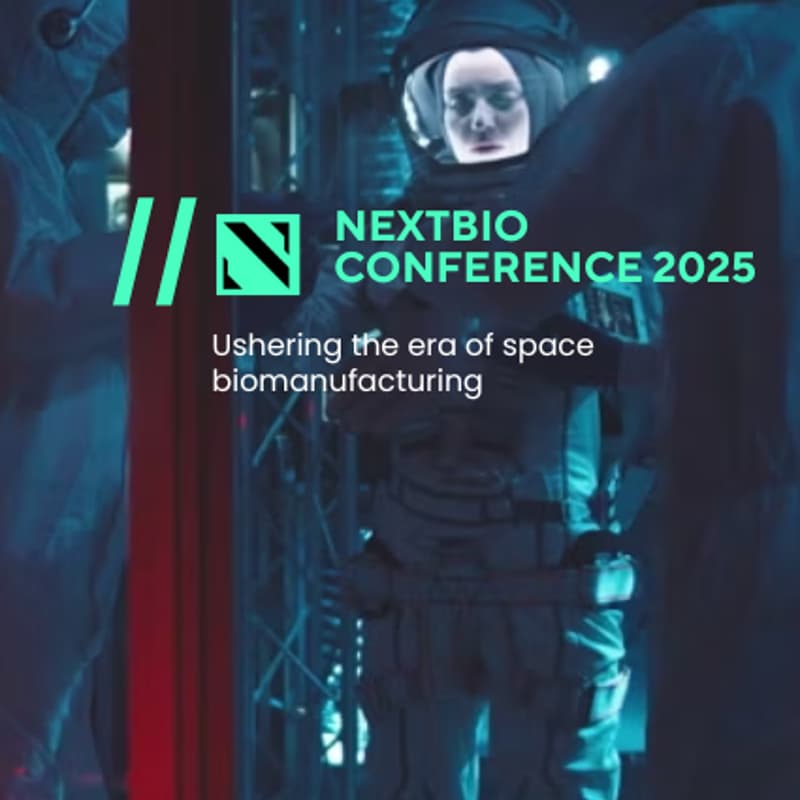

NEXT.BIO 2025 - Ushering the era of space biomanufacturing
In October 2025, A16Z #SFTechWeek will once again take over San Francisco. We are organizing NEXT.BIO, a world-class week long tech conference featuring the best startups, industry leaders and investors in AI x BIO across a series of Tech Events, a unique Hackathon and a DEMO Day 🚀
This event is one of our Tech Event series part of the full-week conference.
🧩 Suggested Themes & Challenges:
Drawing from ESA’s successful model:
Reproducibility & Open Science — Have students work with real space omics datasets (e.g., NASA GeneLab) to design reproducible workflows SpaceAgendaSciSpacE.
Multi-Omics Integration — Challenge teams to combine data types (transcriptomic, proteomic, metabolomic) to uncover new insights.
Experiment Design — Task participants to propose controlled, replicable biological experiments for microgravity or radiation environments.
Applied Biology for Human Health — Use omics data or AI to propose interventions meaningful both in space and on Earth.
Synthetic Biology for Sustainability — Design microbial systems or bio-manufacturing routes suited for space, like bioproduction in resource-limited environments.
Planetary Protection — Develop omics-centric strategies for monitoring and preventing microbial contamination (e.g., of spacecraft or landers).
These challenge themes align closely with ESA’s 2024 hackathon pillars SpaceAgendaSciSpacE.
What is are the space biology available datasets?
🧬 1. NASA GeneLab
GeneLab is NASA’s premier open-access platform for space-related omics data, encompassing genomics, transcriptomics, proteomics, and metabolomics. It houses over 200 datasets derived from various organisms, including mice, fruit flies, plants, microbes, and human cell cultures, all exposed to spaceflight conditions or ground-based analogs. Researchers can download raw and processed data, utilize standardized analysis pipelines, and collaborate through GeneLab’s tools. NASA+1
🌐 2. NASA Open Science Data Repository (OSDR)
OSDR is a centralized portal that provides access to a diverse array of space biology datasets, including omics, physiological, phenotypic, behavioral, and environmental telemetry data. It supports multi-modal and multi-hierarchical data reuse, facilitating both basic and applied research. The repository enables scientists to explore how terrestrial biology responds to spaceflight environments. NASA Science
🧪 3. Ames Life Sciences Data Archive (ALSDA)
ALSDA serves as the official repository for non-human life sciences data generated by NASA’s Space Biology Program and Human Research Program. It archives higher-order phenotypic datasets, including information on tissues, organs, whole organisms, physiology, and behavior. The archive aims to maximize the scientific return from both legacy and future data collections by adhering to FAIR (Findable, Accessible, Interoperable, Reusable) principles. NASA
🔬 4. Space Omics and Medical Atlas (SOMA)
SOMA is an international initiative that has compiled over 90% of publicly available astronaut omics data. It includes comprehensive datasets from missions like SpaceX’s Inspiration4, encompassing omics and clinical assays. SOMA aims to facilitate research on space-induced biological responses and supports the development of countermeasures for long-duration spaceflight. Nature
📚 5. NASA Life Sciences Data Archive (LSDA)
LSDA provides access to a broad spectrum of life sciences data from NASA missions dating back to the Mercury Project. It includes information from human, plant, and animal studies conducted during spaceflight and ground-based analog experiments. The archive serves as a valuable resource for historical data and supports comparative studies across different missions and biological systems. Data.gov